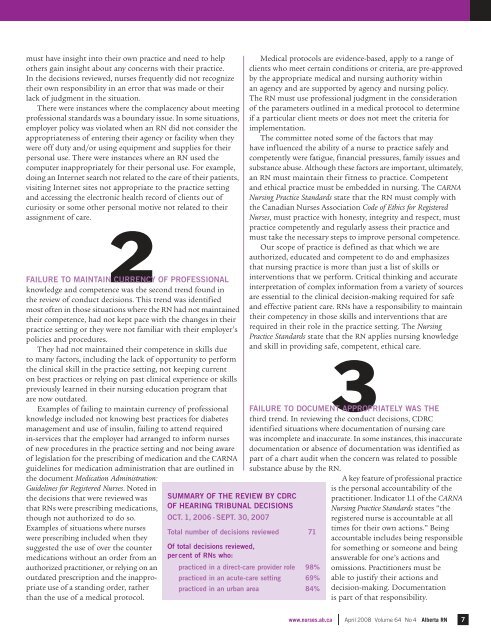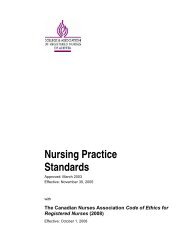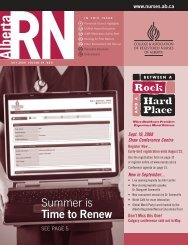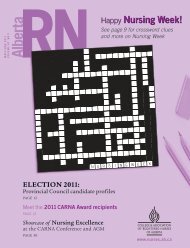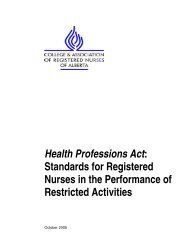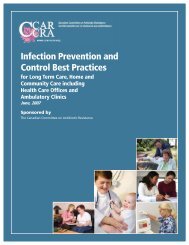I am a nurse. - College & Association of Registered Nurses of Alberta
I am a nurse. - College & Association of Registered Nurses of Alberta
I am a nurse. - College & Association of Registered Nurses of Alberta
You also want an ePaper? Increase the reach of your titles
YUMPU automatically turns print PDFs into web optimized ePapers that Google loves.
must have insight into their own practice and need to help<br />
others gain insight about any concerns with their practice.<br />
In the decisions reviewed, <strong>nurse</strong>s frequently did not recognize<br />
their own responsibility in an error that was made or their<br />
lack <strong>of</strong> judgment in the situation.<br />
There were instances where the complacency about meeting<br />
pr<strong>of</strong>essional standards was a boundary issue. In some situations,<br />
employer policy was violated when an RN did not consider the<br />
appropriateness <strong>of</strong> entering their agency or facility when they<br />
were <strong>of</strong>f duty and/or using equipment and supplies for their<br />
personal use. There were instances where an RN used the<br />
computer inappropriately for their personal use. For ex<strong>am</strong>ple,<br />
doing an Internet search not related to the care <strong>of</strong> their patients,<br />
visiting Internet sites not appropriate to the practice setting<br />
and accessing the electronic health record <strong>of</strong> clients out <strong>of</strong><br />
curiosity or some other personal motive not related to their<br />
assignment <strong>of</strong> care.<br />
2<br />
FAILURE TO MAINTAIN CURRENCY OF PROFESSIONAL<br />
knowledge and competence was the second trend found in<br />
the review <strong>of</strong> conduct decisions. This trend was identified<br />
most <strong>of</strong>ten in those situations where the RN had not maintained<br />
their competence, had not kept pace with the changes in their<br />
practice setting or they were not f<strong>am</strong>iliar with their employer’s<br />
policies and procedures.<br />
They had not maintained their competence in skills due<br />
to many factors, including the lack <strong>of</strong> opportunity to perform<br />
the clinical skill in the practice setting, not keeping current<br />
on best practices or relying on past clinical experience or skills<br />
previously learned in their nursing education progr<strong>am</strong> that<br />
are now outdated.<br />
Ex<strong>am</strong>ples <strong>of</strong> failing to maintain currency <strong>of</strong> pr<strong>of</strong>essional<br />
knowledge included not knowing best practices for diabetes<br />
management and use <strong>of</strong> insulin, failing to attend required<br />
in-services that the employer had arranged to inform <strong>nurse</strong>s<br />
<strong>of</strong> new procedures in the practice setting and not being aware<br />
<strong>of</strong> legislation for the prescribing <strong>of</strong> medication and the CARNA<br />
guidelines for medication administration that are outlined in<br />
the document Medication Administration:<br />
Guidelines for <strong>Registered</strong> <strong>Nurses</strong>. Noted in<br />
the decisions that were reviewed was<br />
that RNs were prescribing medications,<br />
though not authorized to do so.<br />
Ex<strong>am</strong>ples <strong>of</strong> situations where <strong>nurse</strong>s<br />
were prescribing included when they<br />
suggested the use <strong>of</strong> over the counter<br />
medications without an order from an<br />
authorized practitioner, or relying on an<br />
outdated prescription and the inappropriate<br />
use <strong>of</strong> a standing order, rather<br />
than the use <strong>of</strong> a medical protocol.<br />
SUMMARY OF THE REVIEW BY CDRC<br />
OF HEARING TRIBUNAL DECISIONS<br />
OCT. 1, 2006 - SEPT. 30, 2007<br />
Total number <strong>of</strong> decisions reviewed 71<br />
Of total decisions reviewed,<br />
per cent <strong>of</strong> RNs who:<br />
practiced in a direct-care provider role 98%<br />
practiced in an acute-care setting 69%<br />
practiced in an urban area 84%<br />
Medical protocols are evidence-based, apply to a range <strong>of</strong><br />
clients who meet certain conditions or criteria, are pre-approved<br />
by the appropriate medical and nursing authority within<br />
an agency and are supported by agency and nursing policy.<br />
The RN must use pr<strong>of</strong>essional judgment in the consideration<br />
<strong>of</strong> the par<strong>am</strong>eters outlined in a medical protocol to determine<br />
if a particular client meets or does not meet the criteria for<br />
implementation.<br />
The committee noted some <strong>of</strong> the factors that may<br />
have influenced the ability <strong>of</strong> a <strong>nurse</strong> to practice safely and<br />
competently were fatigue, financial pressures, f<strong>am</strong>ily issues and<br />
substance abuse. Although these factors are important, ultimately,<br />
an RN must maintain their fitness to practice. Competent<br />
and ethical practice must be embedded in nursing. The CARNA<br />
Nursing Practice Standards state that the RN must comply with<br />
the Canadian <strong>Nurses</strong> <strong>Association</strong> Code <strong>of</strong> Ethics for <strong>Registered</strong><br />
<strong>Nurses</strong>, must practice with honesty, integrity and respect, must<br />
practice competently and regularly assess their practice and<br />
must take the necessary steps to improve personal competence.<br />
Our scope <strong>of</strong> practice is defined as that which we are<br />
authorized, educated and competent to do and emphasizes<br />
that nursing practice is more than just a list <strong>of</strong> skills or<br />
interventions that we perform. Critical thinking and accurate<br />
interpretation <strong>of</strong> complex information from a variety <strong>of</strong> sources<br />
are essential to the clinical decision-making required for safe<br />
and effective patient care. RNs have a responsibility to maintain<br />
their competency in those skills and interventions that are<br />
required in their role in the practice setting. The Nursing<br />
Practice Standards state that the RN applies nursing knowledge<br />
and skill in providing safe, competent, ethical care.<br />
3<br />
FAILURE TO DOCUMENT APPROPRIATELY WAS THE<br />
third trend. In reviewing the conduct decisions, CDRC<br />
identified situations where documentation <strong>of</strong> nursing care<br />
was incomplete and inaccurate. In some instances, this inaccurate<br />
documentation or absence <strong>of</strong> documentation was identified as<br />
part <strong>of</strong> a chart audit when the concern was related to possible<br />
substance abuse by the RN.<br />
A key feature <strong>of</strong> pr<strong>of</strong>essional practice<br />
is the personal accountability <strong>of</strong> the<br />
practitioner. Indicator 1.1 <strong>of</strong> the CARNA<br />
Nursing Practice Standards states “the<br />
registered <strong>nurse</strong> is accountable at all<br />
times for their own actions.” Being<br />
accountable includes being responsible<br />
for something or someone and being<br />
answerable for one’s actions and<br />
omissions. Practitioners must be<br />
able to justify their actions and<br />
decision-making. Documentation<br />
is part <strong>of</strong> that responsibility.<br />
www.<strong>nurse</strong>s.ab.ca April 2008 Volume 64 No 4 <strong>Alberta</strong> RN 7


